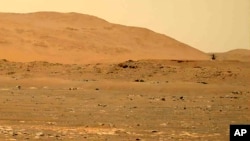About 10 to 20 kilometers below the surface of Mars could be a large amount of water, a study published Monday in the Proceedings of the National Academy of Sciences says.
Scientists say there could be enough water on Mars to fill a global ocean for the Red Planet.
The findings are derived from data collected by NASA’s Mars InSight lander from 2018 to 2022. The lander included a seismometer among its equipment that recorded more than 1,300 marsquakes before it stopped recording the planet’s vibrations.
Researchers, who are still analyzing the data, were able to use the seismic waves information to determine what kinds of materials the waves were encountering.
Professor Michael Manga of the University of California-Berkeley, who was involved in the research, told the BBC that scientists used the same techniques for the Mars research that they use on Earth to find water.
Scientists say Mars had plenty of water on its surface billions of years ago in the form of rivers, lakes and perhaps even an ocean. Researchers believe that as the planet’s atmosphere thinned, some of its water likely seeped underground while other water was lost to space, making Mars a desert about 3 billion years ago.
Manga said the new study is providing an answer to one of the biggest questions about the planet: Where did all the Martian water go?
Geophysicist Vashan Wright of the University of California-San Diego's Scripps Institution of Oceanography, the study’s lead scientist, told The Associated Press that water on Mars doesn’t automatically mean there is life on the planet.
"Instead, our findings mean that there are environments that could possibly be habitable,” he said.
Scientists say equipment for drilling and other tasks is needed to positively confirm the existence of water on Mars.
Some information for this report came from The Associated Press.





